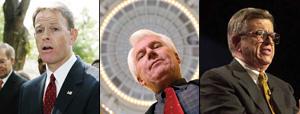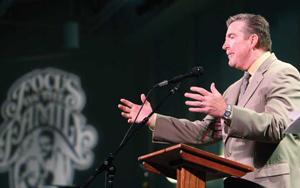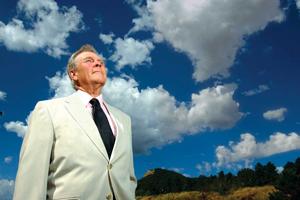Gays Remain Minority Most Targeted by Hate Crimes
The religious anti-gay right has been knocked back on its heels by gay rights advances. But its hardest core angrily presses on
Four teenagers commit suicide in a three-week span after being bullied, taunted or outed as homosexuals. Seven students — at least four of whom had endured anti-gay bullying — kill themselves over the course of a year in a single Minnesota school district. In New York, 10 suspects are arrested for torturing three gay victims. In Covington, Ky., a series of violent anti-gay attacks shock a trendy neighborhood. In Vonore, Tenn., a lesbian couple’s home, its garage spray-painted with “Queers,” is burned to the ground. A rash of attacks hits Washington, D.C. And in Michigan, a prosecutor harasses a local gay rights student leader for months.
All of this is only a sampling of the anti-gay attacks occurring around the nation, most of it drawn from just the last few months. Although the rash of student suicides drew major media attention for a few days, the reality, gay rights advocates say, is that the LGBT world has been plagued by hate violence for years.
But that’s not the way a hard core of the anti-gay religious right sees it.
Responding to the wave of teen suicides — including, most dramatically, that of 18-year-old Tyler Clementi, a Rutgers University student who leaped off the George Washington Bridge in New York City in September — anti-gay leaders instead blamed those who sought to protect students from bullying.
Bryan Fischer of the American Family Association said gay rights activists “pressure these students to declare a disordered sexual preference when they’re too young to know better, [so] they share some culpability.” Family Research Council President Tony Perkins, a key critic of anti-bullying programs, said gay activists were “exploiting these tragedies to push their agenda.” He said that gay kids may know “intuitively” that their desires are “abnormal” and that the claim, pushed by gay activists, that they can’t change “may create a sense of despair that can lead to suicide.” Matt Barber of Liberty Counsel said those activists want “to use the tragedies to increase pressure on the real victims: Christians.”
In fact, the chief target of these anti-gay ideologues — the Gay, Lesbian and Straight Education Network (GLSEN) — has been working to get protection from school bullying for a wide range of racial, religious and sexual minorities, not only LGBT students. It’s extremely hard to see how their efforts are exploitative, or how the “real” victims of bullying are Christians. GLSEN’s mission statement says that it “strives to assure that each member of every school community is valued.”
What’s more, bullying is only the beginning of the violence experienced by gays in American society. The reality is that homosexuals or perceived homosexuals are by far the group most targeted in America for violent hate crimes, according to an Intelligence Report analysis of 14 years of federal hate crime data. The bottom line: Gay people are more than twice as likely to be attacked in a violent hate crime as Jews or blacks; more than four times as likely as Muslims; and 14 times as likely as Latinos.
A Changing Landscape
Remarkably, most Americans today seem to have a sense of the violence that the LGBT community is regularly subjected to, or in any event are increasingly rejecting extreme religious-right narratives about the alleged evils of homosexuality. An October poll by the nonpartisan Public Religion Research Institute found that 65% of Americans believe “places of worship contribute to higher rates of suicide among gay and lesbian youth” (33% said “a lot” and 32% said “a little”). Seventy-two percent said places of worship “contribute to negative views of gay and lesbian people” (40% said “a lot” and 32% said “a little”). (At the same time, the survey found that 44% of Americans still view same-sex relations as a sin.)
This was not always so. In 2003, the legalization of same-sex marriage in most of Canada, plus the U.S. Supreme Court’s striking down of anti-gay sodomy laws in 13 states and a court decision in Massachusetts against gay marriage bans, produced a major backlash. By 2008, fueled by the anti-gay rhetoric and political organizing of religious-right groups, at least 40 states and the federal government had adopted constitutional bans or laws against same-sex marriages.
Since then, the record has been mixed. But it’s clear that public support for same-sex marriage — and opposition to its religious opponents — is on the rise.
Five states now allow same-sex marriage, and another three recognize such unions from other states. California allowed them for some months in 2008, but the Proposition 8 referendum ended that — until a federal judge this fall overturned the proposition, saying it discriminated unconstitutionally against homosexuals. A 2006 federal bill that would have prohibited states from recognizing same-sex marriage failed. By this August, according to a Roper poll, a majority of Americans supported same-sex marriage for the first time. The poll found that 52% said the federal government should recognize such marriages (up from 46% in 2009), and 58% said same-sex couples should be entitled to the same benefits as other couples.
An earlier Gallup poll, released in May 2010, had similar results. It found that Americans now see gay relationships as “morally acceptable” by a 52% to 43% margin — compared to a 55% to 38%unfavorable view just eight years earlier. Every demographic group within the data set grew more accepting — Catholics, for instance, polled as 62% favorable, compared to 46% four years ago.
This fall’s mid-term elections were the first since the 1990s with no measures to ban gay marriage on any state ballot, according to The Associated Press. And although same-sex marriage was an issue at press time in four gubernatorial races, the AP reported, Democratic candidates in Rhode Island and California were vying to become the fourth and fifth openly gay members of Congress.
“We’ve reached a tipping point this year,” said Wayne Besen, founder of TruthWinsOut.com, which monitors the anti-gay right. “The religious right is losing some of its steam. We’re going to win this issue quicker than people think.”
It may not be only gay rights advocates who think so. Last February, after founder James Dobson retired and pastor Jim Daly took over,Focus on the Family — for years, the powerhouse organization of the anti-gay religious right — markedly softened its anti-gay rhetoric. Daly began meeting with gay rights activists, ended the ministry’s controversial “reparative therapy” for gays and lesbians, and even suggested that legalized same-sex marriage might not be a disaster.
“I will continue to defend traditional marriage, but I’m not going to demean human beings for the process,” Daly told an interviewer. “I want to express respect for everyone, all human beings. It’s not about being highly confrontational.”
Digging In
It is in just such situations — when long-held societal notions about blacks, Latinos, Catholics, homosexuals or other minorities are shifting — that violent backlashes often set in. As groups like Focus on the Family have moderated their positions on homosexuality, a hard core of anti-gay groups, sensing they are being politically marginalized, seem to be growing angrier and more radical still.
The reaction of Laurie Higgins of the Illinois Family Institute, may be illustrative. Upon hearing of Daly’s moves, she said the Focus on the Family leader was showing “surprising naïveté,” adding that he instead “better figure out how to stop the pro-homosexual juggernaut.” As to his comments about refusing to “demean human beings,” Higgins said, “The language employed by Mr. Daly here is the kind of language commonly employed by … homosexualists.”
“True conservatives,” Higgins added tartly elsewhere, “need to rethink their cowardly refusal to address the inherent immorality of homosexual practice and their deeply flawed strategy of calling for a moratorium on ‘social issues.’”
A leading criminologist and sociologist of hate crimes, Jack Levin of Northeastern University, sees evidence of the growing radicalization of the fringe in other ways. He says perpetrators of anti-gay hate crimes appear to be getting older. No longer are they dominated by teens engaging in thrill-seeking with predatory gangs of their peers. More and more, he says, lone adults are committing what Levin calls “defensive hate crimes” — crimes carried out in reaction to sweeping social changes that they see as threats to their home, family, religion, culture or country.
The shrinking size of the most virulent parts of the anti-gay religious right was much in evidence at the August “Truth Academy” staged outside Chicago by Peter LaBarbera and his Americans for Truth About Homosexuality. The three-day gathering immediately followed what to many anti-gay activists was a kind of nuclear disaster — the overturning by a federal appeals court judge of Proposition 8, which had temporarily ended gay marriage in California.
And what better motivator than a “homosexual judge” canceling out some 7 million votes against same-sex marriage? But that turned out not to be the case. Subtracting speakers, family members, volunteers and at least four interlopers who attended only to monitor events, the tally of those who paid to hear LaBarbera and the others speak during the first day was almost certainly fewer than 15.
Nevertheless, for many hard-liners, fighting homosexuality is a biblical imperative. They regard being forced to accept uncloseted gays as tantamount to being persecuted as Christians. If same-sex marriage becomes universally legal, the Family Research Council’s Perkins told the “Call to Conscience” rally held in Washington, D.C., on Sept. 4, “In one generation, we will have gone from banning the Bible in public schools to banning religious beliefs in society.”
As a result, the hard core of the anti-gay religious right is digging in. They have gravitated toward three particular tactics: “love the sinner” rhetoric; secular validation; and depicting gays as a global threat.
The Hard-Liners’ New Lines
Not long ago, anti-gay propaganda was remarkable for its vulgar and wild-eyed tone — depicting homosexuals as immoral, feces-eating, disease-ridden pedophiles. And some of that tone, particularly the idea that gays seek to “recruit” children in school, remains in certain quarters. But that kind of approach doesn’t resonate much with younger audiences, who grew up with positive images of openly gay actors, musicians, artists, politicians and business leaders. As gays came out of the closet, others increasingly found they had gay friends and relatives.
Now, more and more groups on the religious right are framing their arguments with words that are meant to show respect for gays and lesbians. There is no better example of that than the Manhattan Declaration, drafted in 2009 by Watergate conspirator-turned-evangelist Charles Colson, Princeton University professor Robert P. George and Beeson Divinity School Dean Rev. Timothy George.
The declaration framed opposition to same-sex marriage as part of seeking an end to the “glamorizing” of promiscuity and infidelity generally. It emphasized that “our rejection of sin, though resolute, must never become the rejection of sinners.” It conceded that “there are sincere people who disagree with us … on questions of sexual morality and the nature of marriage.” “And so,” it concluded, “it is out of love (not ‘animus’) and prudent concern for the common good (not ‘prejudice’), that we pledge to labor ceaselessly to preserve the legal definition of marriage.”
That kinder, gentler language drew the support of many, but not as many as the religious right was used to getting. After setting a goal of obtaining 1 million signatures within 10 days of its Nov. 20, 2009, release, organizers said this Aug. 3 — almost nine months later — that they had amassed 463,000 signatures.
Another emphasis has been in seeking secular validation for anti-gay arguments — scientific evidence of the alleged pitfalls of homosexuality. Many on the religious anti-gay right now frame their arguments almost entirely around the idea that homosexuals present various dangers to children, that they will live short and unhappy lives, that they are more vulnerable to disease, and so on.
The clearest statement of this may have come in late 2008 from Paul Cameron of the Family Research Institute: “We can no longer rely — as almost all pro-family organizations do today — on gleaning scientific ‘bits’ from those in liberal academia… . [W]e must subvert the academy by doing original, honest research ourselves and use this to advance the historic Christian faith.”
There’s just one trouble with this approach. Almost all the “facts” trotted out by the religious right about gays turn out to be false or misleading. And no one does more to create these myths than Cameron, whose work has been repudiated by three scholarly associations. (Others who are commonly cited as “researchers” by the anti-gay right include Joe Dallas, John R. Diggs, Joseph Nicolosi and the late Charles Socarides.) In addition, many scholars who do serious work in the area of sexuality say their work is misused by anti-gay groups. In fact, at least 11 legitimate scientists have recorded video statements saying their work was being mischaracterized by the religious right.
Related to this effort has been the creation of “ex-gay” therapies — programs run by the religious right that claim, against the weight of scientific evidence, to be able to turn homosexuals into heterosexuals. The problem is that so few people seem to have made the change — and so many who supposedly did later repudiated it.
A final new emphasis being used by many of the hard-core anti-gay groups is the charge that homosexuals make up, in effect, an active conspiracy whose agenda includes the destruction of Christianity and, ultimately, Western civilization. Sometimes, their propaganda sounds noticeably like Nazi descriptions of Jewish plots.
In a Feb. 6 column headlined “The bitter fruit of decriminalizing homosexual behavior,” for example, the American Family Association’s Bryan Fischer paraphrased another writer, agreeing that decriminalizing homosexuality had left society facing “a powerful, vicious, and punitive homosexual cabal that is determined to overthrow completely what remains of Judeo-Christian standards of sexual morality in the West.” Fischer adds that, “as [the writer] points out,” gays have received “special protections … which come at the expense of religious liberty, freedom of conscience, freedom of speech and freedom of association and lead to the punishment, intimidation and harassment of any who oppose their agenda.”
For his part, reflecting on “the rise of gay power in the culture,” Americans for Truth About Homosexuality’s LaBarbera sounded a similar theme during a radio broadcast last summer, saying, “The homosexual activist movement has very strategically insinuated itself into every sphere of power in our society.”
And at the Chicago-area Truth Academy, Robert Knight of Coral Ridge Ministries cited a 2008 Timemagazine article that he said “makes the case that the Democratic Party is a fully owned subsidiary of a group of homosexual billionaires.” (In fact, the article discussed a group of wealthy gay men and their effect on pro-gay politics.) Knight then went a few steps further, saying that homosexuals in the nation’s capital have “blackmail power.”
How is that? So many gays work in the hospitality industry, Knight claimed, that “they see congressmen dallying with their secretaries. They see them with their mistresses, and they let them know if they step out of line on the gay issue, it just might find its way into the wrong hands.” He offered no evidence.
“The gay Mafia in Washington,” he concluded. “It’s very real.”
Facing the Future
In the end, many legal observers have suggested, same-sex marriage — or “marriage equality,” in the words of its backers — may well be legalized across the United States, whether through the actions of the courts or the legislatures. But that doesn’t mean that the hard core of religious resistance is about to disappear.
Frederick Clarkson, an independent journalist who has written about the American religious right for a quarter of a century, notes that the social conflicts set off by Roe v. Wade and Brown v. Board of Education continued for decades after the Supreme Court ruled. Moderating public attitudes toward homosexuality, he says, are viewed by the religious right as “symptoms of a society that has fallen away from God’s laws, seriously enough that God is ready to smack the country down.”
After all, to the hard core of that anti-gay religious right, Clarkson says, “homosexuality is a profound capital offense against God’s order.”
The upshot, in all likelihood, is that violence, hatred and bullying of those perceived as homosexual will continue into the foreseeable future. Although leaders of the hard core of the religious right deny it, it seems clear that their demonizing propaganda plays a role in fomenting that violence — a proposition that has sparked a number of Christian leaders to speak out in the wake of the latest series of tragedies.
“The recent epidemic of bullying-related teen suicides is a wake-up call to us moderate Christians,” the Rev. Fritz Ritsch, pastor of St. Stephen Presbyterian Church, wrote in October in the Fort Worth, Texas, Star-Telegram. “To most unchurched Americans — meaning most Americans — the fruit of the church is bitter indeed. … [T]he bullying crisis has put a fine point on the need for moderates to challenge the theological bullies from our own bully pulpits. We cannot equivocate. Children are dying. We need to speak up. If not now, when?”






